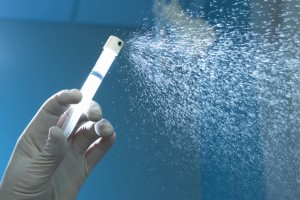
Regenerative Epithelial Suspension (RES™) (pictured being sprayed)
A device used to treat burns, skin defects and scars is at the centre of a research partnership to unlock the secrets of its ability to work so effectively on hard-to-heal wounds.
Avita Medical Ltd, a regenerative medicine company specializing in developing products and technology that provide innovative treatment solutions derived from a patient’s own skin.
Its lead product, ReCell®, can be used by a clinician to rapidly create, at point of care in approximately 30 minutes, a treatment solution called Regenerative Epithelial Suspension (RES™) using a small sample of the patient’s skin. This is an autologous suspension comprising the cells and wound healing factors necessary to regenerate natural, healthy skin, which can be used to restart healing in unresponsive wounds, to repair burns using less donor skin yet with improved functional and aesthetic outcomes.
A partnership was set up in 2015 between Avita Medical Ltd and the University of Huddersfield’s Institute of Skin Integrity and Infection Prevention to to better understand the ability of RES™ to effectively treat these types of skin wounds. The Institute of Skin Integrity and Infection Prevention is an inter-disciplinary group whose members can pool an enormous range of expertise.
The research aims to gain further understanding of the cellular interactions present in RES™ and the roles these play in regenerating natural healthy skin. This could help clinicians to make more informed patient selection and lead to superior clinical outcomes.
Senior Lecturer in Biological Sciences Dr Nikolaos Georgopoulos, Reader in Advancing Clinical Practice Dr Karen Ousey and Professor of Pharmaceutics Barbara Conway – from the University of Huddersfield’s Institute of Skin Integrity and Infection Prevention – will assess the ReCell® device using donated human skin to produce RES™.
This collaborative work promises to make a real difference in people’s lives and contribute to their wellbeing as well as investigating the full potential of Regenerative Epithelial Suspension.
Following this initial collaborative evaluation, Avita Medical and the University of Huddersfield intend to finalise a longer-term strategy to explore the RES™ mechanism.



